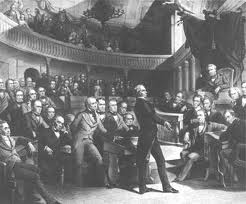(Rating 4 of 5)
William Jennings Bryan is a complicated figure in
history. After reading this biography,
I—much like the author—am still not sure how I feel about him. Bryan in his time inspired a lot of
people. He had a mass following in this
country. He is one of only a handful of
Americans who carried a major party’s banner three times. The others were Thomas Jefferson, Andrew
Jackson, Henry Clay, Grover Cleveland, Franklin D. Roosevelt, and Richard M. Nixon. Nevertheless he leaves behind a complicated
legacy.
Bryan
was never elected to anything higher than a seat in the U.S. House of
Representatives and his brief time there can be considered unremarkable. He was also very inefficient in the highest
post he ever earned: Secretary of State of the United States. What could be fair to say about Bryan is he
played a type of a liberal Barry Goldwater role for Franklin D. Roosevelt’s New
Deal the same way the real Goldwater paved the way for Reagan
conservatism. Bryan espoused polices
that helped the Democratic Party break away from its phobia about the Federal
Government’s powers. Bryan told the
Democrats that the government could actually be used for good.
 |
| Bryan on the campaign trail |
He also
changed the way people would run for president.
Bryan actually ran for
president. By the end of the century it
was common for candidates for the highest office to actively campaign, instead
of staying home and running through surrogates.
He also would come to advance popular causes, such as women’s suffrage,
that were long overdue.
 |
| Woodrow Wilson's Cabinet, Bryan served as Secretary of State ineffectively |
Despite
this there are extremely negative things about him as well. He allowed his religion to often cloud his
judgment. Bryan was always so convinced
that he was right and God was on his side that he labeled anyone who opposed
him was acting against the will of the Lord. He
was completely deaf to constructive criticism and that attitude turned former
supporters against him. Bryan supported
and helped pass prohibition and never could see how it was a complete
failure. Bryan also turned back science
education in his useless war on evolution.
Even some of the defenses that Kazin comes up with to explain his
position doesn’t excuse his over reach and how he harm he caused to the
education of students that continues to this day.
 |
| Bryan vs Darrow in the famous Scopes Trial |
Then
there is his stance on race. I have long
accepted that there are historical figures who I admire, who had opinions on
race—and other things—that I now find abhorrent. (Already we have mentioned Jefferson.) I also understand that politics is always of
the possible and sometimes even sympathetic politicians have to make choices in
the name of political necessity. (John
Kennedy, Lyndon B. Johnson, and Bill Clinton come to mind.) However as Kazin points out his racism and
racist positions are not based on any political calculus, but rather blind
bigotry. It makes his whole
anti-imperialism crusade look hypocritical.
The nicest thing you could say about his racial legacy was that his
populist campaigns helped pave the way for other social movements that would
challenge those issues to rise up.














